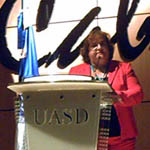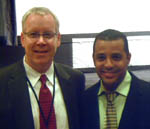Issue of AIDS of “I Am Because We Are” Generates Debate at the Autonomous University
Santo Domingo,
November 20, 2008
Following the showing of the film at the library auditorium, various experts expressed their opinions about the illness.
The showing of I am Because We Are at the Pedro Mir auditorium of the UASD´s library was the second screening of the film in the II Dominican Global Film Festival. The first showing was the day before at the National Theater.
The audience at this screening was mostly university students who watched the tragic story of hundreds of thousands of children in Malawi who are orphaned as a result of HIV/AIDS or themselves are infected by the disease.
Following the film, a panel discussion was held in the auditorium. The 3-member panel was made up of Rafael Lora, from the General Directorate of the Council for the Control of Sexually Transmitted Infectious Diseases and AIDS, who said “as a country, we can identify with Malawi´s story because we have a very high prevalence of HIV/AIDS. We have a National Strategic Plan that offers free treatment, anti-retro viral therapy and comprehensive medical attention to help prevent further physical deterioration. HIV/AIDS is fast becoming a chronic illness,” he said.
 |
|
Sara Menéndez |
Another panel member, Sara Menéndez from the UNICEF HIV/AIDS Program added that UNICEF does not share the approach toward the problem presented in the film. She understood that the message in the documentary was meant to sensitize people to the issue. She explained that UNICEF has four basic priorities: prevention in adolescents, vertical prevention, care and treatment for children infected with HIV/AIDS and protection of the rights of children with the virus. “Families who live with HIV/AIDS are much poorer than those who do not,” she explained.
 |
|
Patrick Donnelly,
Rafael Lora |
The third panelist was Patrick Donnelly, member of the Board of Directors of the Nyumbani Beneficial Organization (United States). He said the organization helps children with HIV/AIDS by providing education and free medical treatment. HIV/AIDS is a big problem in the area of southern Africa where an estimated 12 million children suffer from the disease.
He expressed concern that the disease will become a global crisis that we will all have to confront. “To the extent that this affects the population, it also affects the possibility that governments will support these types of programs,” noted
Dr. Donnelly.
|








